Unit 2 Neighbours Grammar课件(共40张PPT)
文档属性
| 名称 | Unit 2 Neighbours Grammar课件(共40张PPT) | 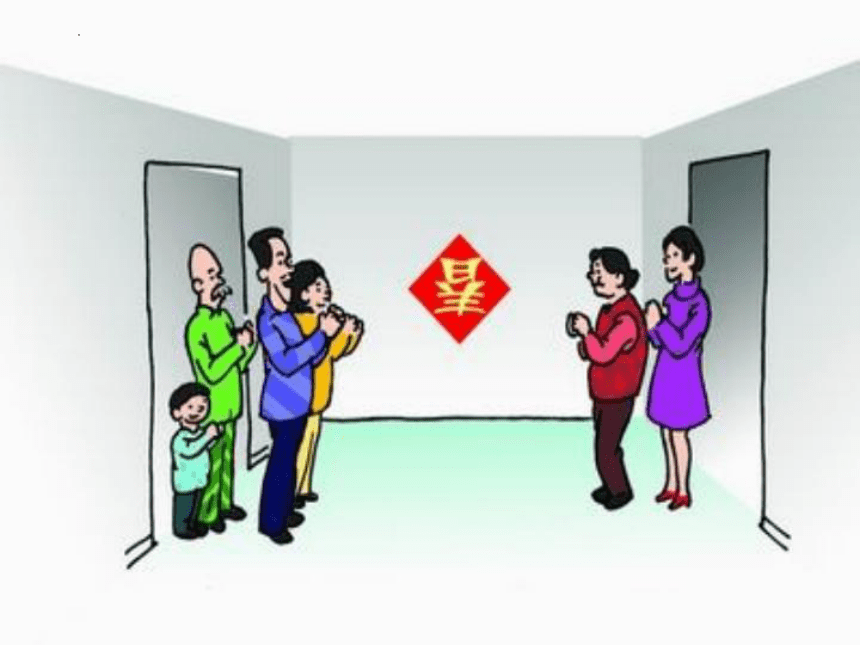 | |
| 格式 | zip | ||
| 文件大小 | 2.2MB | ||
| 资源类型 | 教案 | ||
| 版本资源 | 牛津译林版 | ||
| 科目 | 英语 | ||
| 更新时间 | 2022-03-07 20:56:42 | ||
图片预览

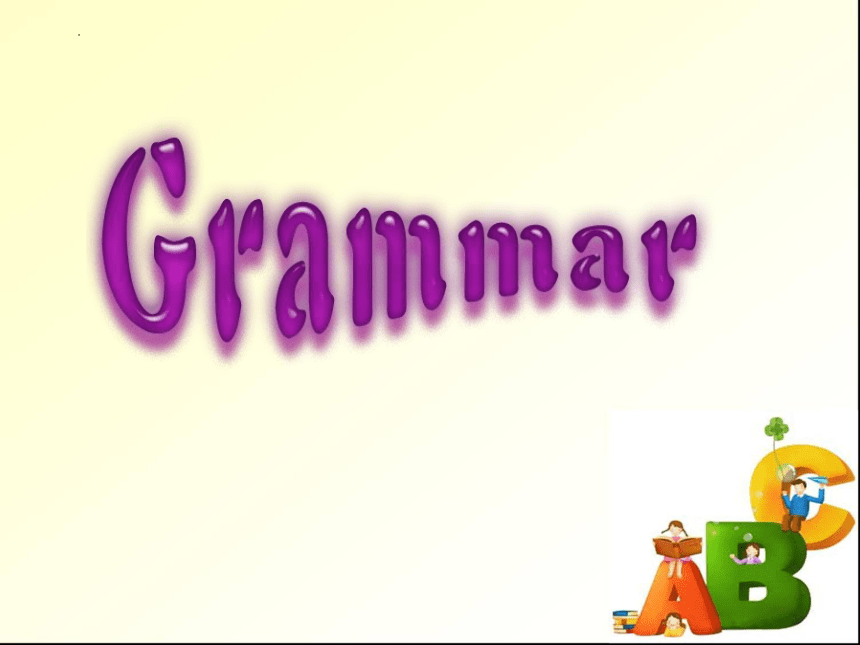

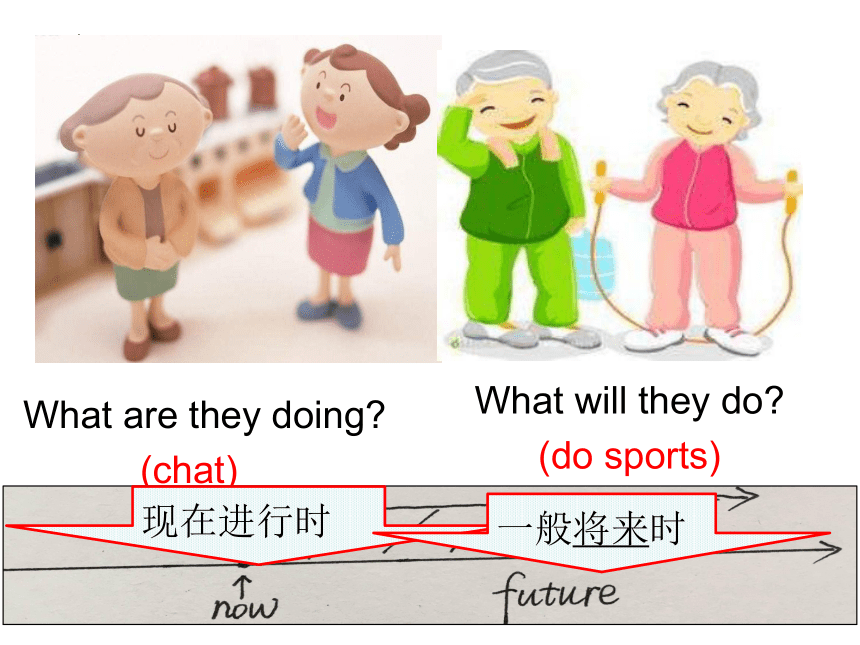


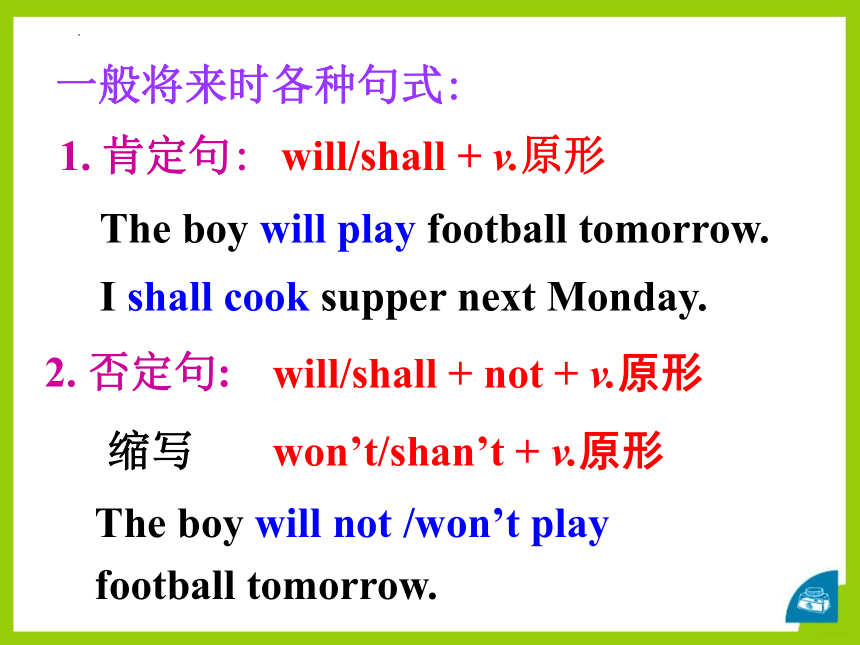


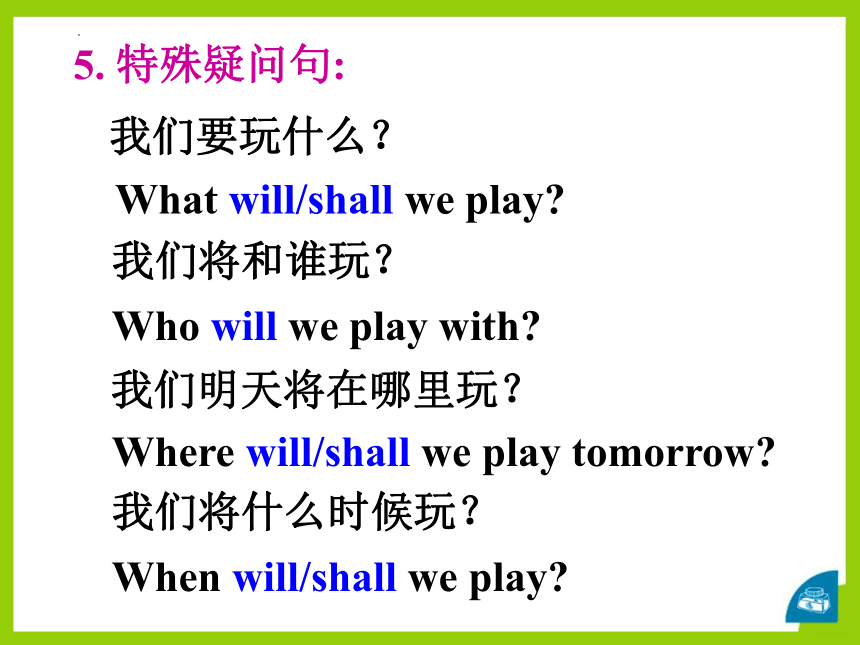
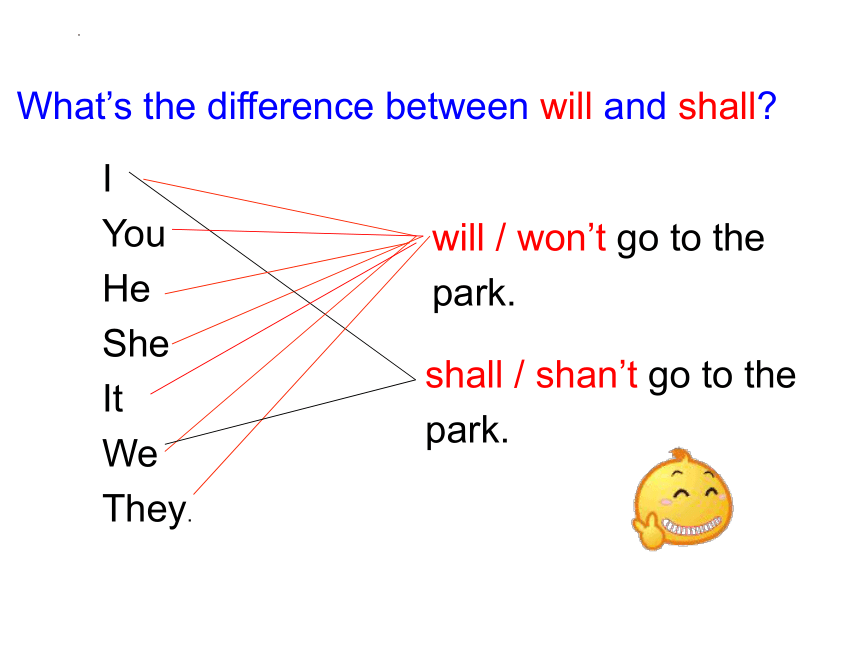

文档简介
(共40张PPT)
Unit 2
Neighbours
What are they doing
(water the flowers)
What will they do
(cook)
Look at these pictures and answer the questions.
What are they doing
(chat)
What will they do
(do sports)
现在进行时
一般将来时
一般将来时
A. Simple future tense with will and shall
1. things that are sure to happen in the future.
表示将来一定会发生的事情。 (“客观一定”)
1) I will be 30 years old next year.
2) It will rain tomorrow.
2. plans that we are making now表说话时所做
的决定。 ( “临时起意”)
A:It is rainy outside. You'd better not go out.
B: Don't worry. I will take an umbrella with
me.
一般将来时各种句式:
1. 肯定句:
will/shall + v.原形
The boy will play football tomorrow.
I shall cook supper next Monday.
2. 否定句:
will/shall + not + v.原形
won’t/shan’t + v.原形
The boy will not /won’t play football tomorrow.
缩写
I shall not /shan’t cook supper next Monday.
3. 一般疑问句:
将will/shall置于句首。
Will the boy play football tomorrow
Shall I cook supper next Monday
4. 一般疑问句回答:
肯定: Yes, 人称代词 + will/shall.
否定: No, 人称代词 + won’t/shan’t.
Yes, I shall.
Yes, he will.
No, I shan’t.
Yes, he won’t.
5. 特殊疑问句:
What will/shall we play
Who will we play with
我们要玩什么?
我们将和谁玩?
我们明天将在哪里玩?
Where will/shall we play tomorrow
我们将什么时候玩?
When will/shall we play
I
You
He
She
It
We
They.
will / won’t go to the park.
shall / shan’t go to the park.
What’s the difference between will and shall
We use will after “I, we, you, he, she, it and they”.
We use shall after “I or we”. (old-fashioned)
will 用于所有人称。
shall 用于第一人称。
注意几组缩写形式:
I will/shall = I’ll
Will not = won’t
Shall not = shan’t (old-fashioned)
Simon’s computer is broken. He is asking someone at the community centre for plete their conversation with the simple future tense of the verbs in brackets.
Asking for help
Mr Lin: Hello, Simon. Do you need any help
Simon: Yes, Mr Lin. There’s something wrong with my computer.
Mr Lin: OK. We ____________ (ask) an engineer to check it for you.
Simon: When ____ the engineer ___ (be) free
shall/will ask
will
be
Mr Lin: Well, we _______ (call) him first. _____ you _____ (wait) for us to call back
Simon: All right. I _____________ (wait) for your call, Thanks.
Mr Lin: You’re welcome.
will call
Will
wait
will/shall wait
1. Amy will do her homework tonight.
(否定句)
(一般疑问句)
(肯定、否定回答)
(对划线部分提问)
Amy won’t do her homework tonight.
Will Amy do her homework tonight
Yes, she will.
No, she won’t.
What will Amy do tonight
I. 句型转换:
2. The flat will belong to Tom next year.
(否定句)
(一般疑问句)
(否定回答)
(对划线部分提问)
The flat won’t belong to Tom next year.
Will the flat belong to Tom next year
No, it will not/won’t.
Who will the flat belong to next year
3. I shall eat noodles this evening.
(1)
(2)
4. My mother will carry all the food.
(1)
(2)
What shall I eat this evening
When shall I eat noodles
What will my mother carry
Who will carry all the food
(对划线部分提问)
II. 用正确的时态填空。
1. The twin brothers _______ (go) fishing next Tuesday.
2. We _____________ (meet) outside the school gate tomorrow.
3. — How ____ they ____ (visit) the History Museum next week
— By bus.
will go
will/shall meet
will visit
4. He tried three times, he _________ (finish) this hard work in the end.
5. Look! The sun _________ (shine) in through the window.
6. _____ we ____ (take) different routes
7. Madee _____ (live) in a small town in Thailand. It __ (be) beautiful and quiet there, but it _____ (rain) a lot.
will finish
is shining
Shall take
lives
is
rains
8. He ________ (sit) on the balcony and _______ (look) out at the park at present.
9. — When ____ you ______ (arrive) in Beijing
— Two hours later.
10. — How long _____ it ____ (take) you to get there by train
— Two hours and a half.
is sitting
looking
will arrive
does take
We use be going to to talk about fixed plans for a certain time in the near future.
be going to 结构的含义:
1. 表示计划、打算或在不远的将来要做某事。 (“预谋已久”)
B.Simple future tense with be going to
We use be going to to talk about things that will probably happen.
2. 表示将可能发生的事。(“主观判断很有可能”)
Match
I
You
He
She
It
We
They
am going to
are going to
is going to
be going to各种句式:
1. 肯定句:
be going to + v.原形
2. 否定句:
be + not + going to + v.原形
The boy is going to play football tomorrow.
The boy is not /isn’t going to play football tomorrow.
3. 一般疑问句:
将be置于句首。
Is the boy going to play football tomorrow
4. 一般疑问句回答:
肯定: Yes, 人称代词 + be.
Yes, he is.
否定: No, 人称代词 + be + not.
No, he isn’t.
5. 特殊疑问句:
(1) 疑问词 + be + 主语 + going to + v.原形
Where is he going
他打算去哪里?
Who is going to play football
你打算去哪里踢足球?
(2) 疑问词 + is + going to + v.原形 + 其他
你打算什么时候去踢足球?
谁打算去踢足球?
When are you going to play football
Where are you going to play football
将来时的典型标志:
next Tuesday / week / month …
Tomorrow (morning/afternoon …)
this afternoon … /Sunday …
tonight
the coming Sunday…
the day after tomorrow
soon
in the future
今夜
不久
(在)将来
后天
in + 一段时间
……后
即将到来的星期天……
Pay attention to these!
有些动词,如:come, go, leave 等,其现在进行时可表示将来时。
eg. We are leaving on Sunday.
Lisa is coming back from New York tomorrow.
Is your father going to the USA soon
Simon is telling Amy about his plan for a day out with his uncle’s family. Help him use the correct forms of be going to to talk about his plan.
Planning a day out
Simon: Hi, Amy. My parents and I are planning a day out with my uncle’s family the day after tomorrow.
Amy: Great! What ____ you ___________ (do)
Simon: I _______________ (buy) some food, and my cousin Annie ____
___________ some plates and forks.
are
going to do
am going to buy
is
going to buy
Amy: What ____ your parents __________ (do)
Simon: They _________________ (bring) some water.
Amy: How about your uncle
Simon: He _______________ (make) a fire.
going to do
are
are going to bring
is going to make
Amy: And your aunt What ____ she ________ do
Simon: She ______________ (cook) some food.
is
going to
is going to cook
Will/shall & be going to
Are they the same or different
The same. 如:我打算买可乐。既可以说I will buy cola.又可以说I am going to buy cola.
Different. 如:我明年11岁。只能说I will be 11 years old.
Your opinion(观点)
都可以表示将要发生的事,将要去做某事,两者有时可以互换;但有时有区别:
will/shall & be going to
1.be going to 表示主观上判断很有可能会发生的
事情,will表示客观上势必发生的事情。
The car is broken. We are going to be late.
It will be the year of 2021 next year.
2. 都可以表示将来的打算和意图,但”预谋已
久”的用be going to, “临时起意”的用will。
We are going to have an exam next week.
He will go walking on the playground.
We _______________ (meet) outside the school gate tomorrow.
2. How ____ they ___________ (visit) the History Museum next week
3. Look! The sun _________ (shine) in through the window.
4. He _________ (sit) on the balcony and _______ (look) out at the park at present.
shall/will meet
are going to meet
will
visit
are
going to visit
is shining
is sitting
looking
5. We are going to have an exam next week.(改为否定句并提问)
6. Tom will see a film this evening.
(提问)
We aren’t going to have an exam next week.
What are we going to have next week
What will Tom see this evening
7. Madee is studying Chinese now.
(用 next year 改写)
8. 两天后学校里将有一场排球比赛。
Madee will/is going to study Chinese next year.
There will/is going to be a volleyball match at school in two days.
Unit 2
Neighbours
What are they doing
(water the flowers)
What will they do
(cook)
Look at these pictures and answer the questions.
What are they doing
(chat)
What will they do
(do sports)
现在进行时
一般将来时
一般将来时
A. Simple future tense with will and shall
1. things that are sure to happen in the future.
表示将来一定会发生的事情。 (“客观一定”)
1) I will be 30 years old next year.
2) It will rain tomorrow.
2. plans that we are making now表说话时所做
的决定。 ( “临时起意”)
A:It is rainy outside. You'd better not go out.
B: Don't worry. I will take an umbrella with
me.
一般将来时各种句式:
1. 肯定句:
will/shall + v.原形
The boy will play football tomorrow.
I shall cook supper next Monday.
2. 否定句:
will/shall + not + v.原形
won’t/shan’t + v.原形
The boy will not /won’t play football tomorrow.
缩写
I shall not /shan’t cook supper next Monday.
3. 一般疑问句:
将will/shall置于句首。
Will the boy play football tomorrow
Shall I cook supper next Monday
4. 一般疑问句回答:
肯定: Yes, 人称代词 + will/shall.
否定: No, 人称代词 + won’t/shan’t.
Yes, I shall.
Yes, he will.
No, I shan’t.
Yes, he won’t.
5. 特殊疑问句:
What will/shall we play
Who will we play with
我们要玩什么?
我们将和谁玩?
我们明天将在哪里玩?
Where will/shall we play tomorrow
我们将什么时候玩?
When will/shall we play
I
You
He
She
It
We
They.
will / won’t go to the park.
shall / shan’t go to the park.
What’s the difference between will and shall
We use will after “I, we, you, he, she, it and they”.
We use shall after “I or we”. (old-fashioned)
will 用于所有人称。
shall 用于第一人称。
注意几组缩写形式:
I will/shall = I’ll
Will not = won’t
Shall not = shan’t (old-fashioned)
Simon’s computer is broken. He is asking someone at the community centre for plete their conversation with the simple future tense of the verbs in brackets.
Asking for help
Mr Lin: Hello, Simon. Do you need any help
Simon: Yes, Mr Lin. There’s something wrong with my computer.
Mr Lin: OK. We ____________ (ask) an engineer to check it for you.
Simon: When ____ the engineer ___ (be) free
shall/will ask
will
be
Mr Lin: Well, we _______ (call) him first. _____ you _____ (wait) for us to call back
Simon: All right. I _____________ (wait) for your call, Thanks.
Mr Lin: You’re welcome.
will call
Will
wait
will/shall wait
1. Amy will do her homework tonight.
(否定句)
(一般疑问句)
(肯定、否定回答)
(对划线部分提问)
Amy won’t do her homework tonight.
Will Amy do her homework tonight
Yes, she will.
No, she won’t.
What will Amy do tonight
I. 句型转换:
2. The flat will belong to Tom next year.
(否定句)
(一般疑问句)
(否定回答)
(对划线部分提问)
The flat won’t belong to Tom next year.
Will the flat belong to Tom next year
No, it will not/won’t.
Who will the flat belong to next year
3. I shall eat noodles this evening.
(1)
(2)
4. My mother will carry all the food.
(1)
(2)
What shall I eat this evening
When shall I eat noodles
What will my mother carry
Who will carry all the food
(对划线部分提问)
II. 用正确的时态填空。
1. The twin brothers _______ (go) fishing next Tuesday.
2. We _____________ (meet) outside the school gate tomorrow.
3. — How ____ they ____ (visit) the History Museum next week
— By bus.
will go
will/shall meet
will visit
4. He tried three times, he _________ (finish) this hard work in the end.
5. Look! The sun _________ (shine) in through the window.
6. _____ we ____ (take) different routes
7. Madee _____ (live) in a small town in Thailand. It __ (be) beautiful and quiet there, but it _____ (rain) a lot.
will finish
is shining
Shall take
lives
is
rains
8. He ________ (sit) on the balcony and _______ (look) out at the park at present.
9. — When ____ you ______ (arrive) in Beijing
— Two hours later.
10. — How long _____ it ____ (take) you to get there by train
— Two hours and a half.
is sitting
looking
will arrive
does take
We use be going to to talk about fixed plans for a certain time in the near future.
be going to 结构的含义:
1. 表示计划、打算或在不远的将来要做某事。 (“预谋已久”)
B.Simple future tense with be going to
We use be going to to talk about things that will probably happen.
2. 表示将可能发生的事。(“主观判断很有可能”)
Match
I
You
He
She
It
We
They
am going to
are going to
is going to
be going to各种句式:
1. 肯定句:
be going to + v.原形
2. 否定句:
be + not + going to + v.原形
The boy is going to play football tomorrow.
The boy is not /isn’t going to play football tomorrow.
3. 一般疑问句:
将be置于句首。
Is the boy going to play football tomorrow
4. 一般疑问句回答:
肯定: Yes, 人称代词 + be.
Yes, he is.
否定: No, 人称代词 + be + not.
No, he isn’t.
5. 特殊疑问句:
(1) 疑问词 + be + 主语 + going to + v.原形
Where is he going
他打算去哪里?
Who is going to play football
你打算去哪里踢足球?
(2) 疑问词 + is + going to + v.原形 + 其他
你打算什么时候去踢足球?
谁打算去踢足球?
When are you going to play football
Where are you going to play football
将来时的典型标志:
next Tuesday / week / month …
Tomorrow (morning/afternoon …)
this afternoon … /Sunday …
tonight
the coming Sunday…
the day after tomorrow
soon
in the future
今夜
不久
(在)将来
后天
in + 一段时间
……后
即将到来的星期天……
Pay attention to these!
有些动词,如:come, go, leave 等,其现在进行时可表示将来时。
eg. We are leaving on Sunday.
Lisa is coming back from New York tomorrow.
Is your father going to the USA soon
Simon is telling Amy about his plan for a day out with his uncle’s family. Help him use the correct forms of be going to to talk about his plan.
Planning a day out
Simon: Hi, Amy. My parents and I are planning a day out with my uncle’s family the day after tomorrow.
Amy: Great! What ____ you ___________ (do)
Simon: I _______________ (buy) some food, and my cousin Annie ____
___________ some plates and forks.
are
going to do
am going to buy
is
going to buy
Amy: What ____ your parents __________ (do)
Simon: They _________________ (bring) some water.
Amy: How about your uncle
Simon: He _______________ (make) a fire.
going to do
are
are going to bring
is going to make
Amy: And your aunt What ____ she ________ do
Simon: She ______________ (cook) some food.
is
going to
is going to cook
Will/shall & be going to
Are they the same or different
The same. 如:我打算买可乐。既可以说I will buy cola.又可以说I am going to buy cola.
Different. 如:我明年11岁。只能说I will be 11 years old.
Your opinion(观点)
都可以表示将要发生的事,将要去做某事,两者有时可以互换;但有时有区别:
will/shall & be going to
1.be going to 表示主观上判断很有可能会发生的
事情,will表示客观上势必发生的事情。
The car is broken. We are going to be late.
It will be the year of 2021 next year.
2. 都可以表示将来的打算和意图,但”预谋已
久”的用be going to, “临时起意”的用will。
We are going to have an exam next week.
He will go walking on the playground.
We _______________ (meet) outside the school gate tomorrow.
2. How ____ they ___________ (visit) the History Museum next week
3. Look! The sun _________ (shine) in through the window.
4. He _________ (sit) on the balcony and _______ (look) out at the park at present.
shall/will meet
are going to meet
will
visit
are
going to visit
is shining
is sitting
looking
5. We are going to have an exam next week.(改为否定句并提问)
6. Tom will see a film this evening.
(提问)
We aren’t going to have an exam next week.
What are we going to have next week
What will Tom see this evening
7. Madee is studying Chinese now.
(用 next year 改写)
8. 两天后学校里将有一场排球比赛。
Madee will/is going to study Chinese next year.
There will/is going to be a volleyball match at school in two days.
